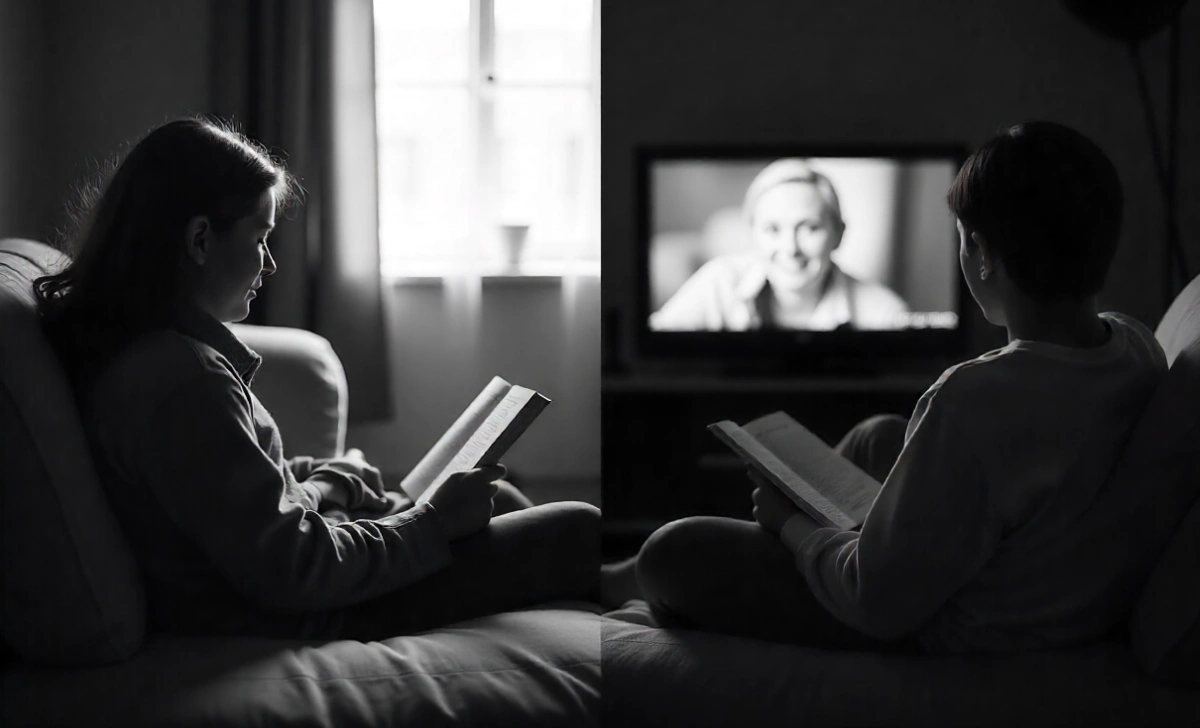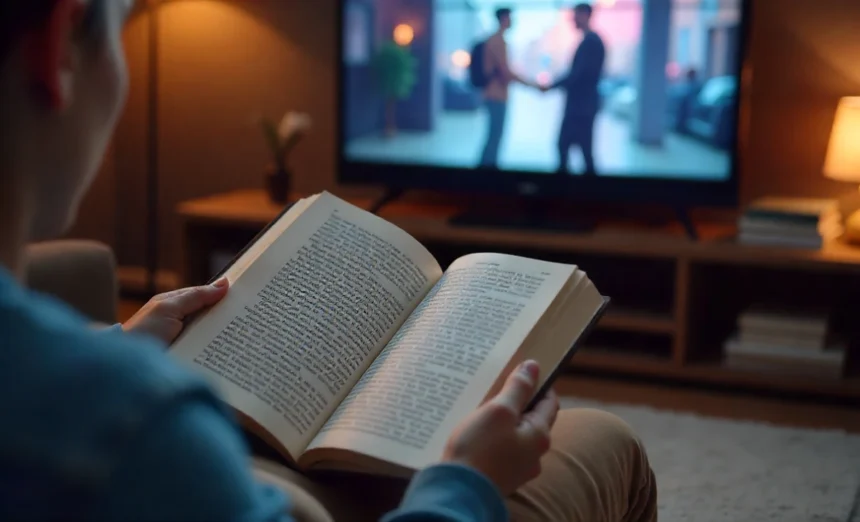You’ve just discovered your favourite book is getting the Netflix treatment. Your heart races with excitement, but then doubt creeps in. Should you read the source material first, or dive straight into the show? This dilemma haunts book lovers and streaming fans across Australia.
- The Case Against Reading First: Preserving the Element of Surprise
- Plot Twists Hit Harder When You Don’t See Them Coming
- Visual Storytelling Becomes Your Primary Experience
- The Benefits of Reading Source Material First
- Enhanced Character Development and World-Building
- Spotting Adaptation Changes Becomes Part of the Fun
- Different Genres, Different Rules
- Fantasy and Sci-Fi: Books Often Win
- Thrillers and Mysteries: Shows Might Be Better First
- Historical Drama: Either Approach Works
- The Middle Ground: Strategic Reading Timing
- When Books and Shows Tell Different Stories
- Making Your Personal Decision
- The Verdict: Both Approaches Have Merit
The debate around whether to read the book before showing the spoilers affects your viewing experience, splitting audiences down the middle. Some swear by going in blind, while others insist the book enriches every scene.
Let’s explore both sides and help you make the right choice for your next binge-watch.
The Case Against Reading First: Preserving the Element of Surprise
Plot Twists Hit Harder When You Don’t See Them Coming
Television shows thrive on shock value. When you know Ned Stark dies in Game of Thrones or that the butler commits the murder, the emotional punch loses its force. Your brain anticipates the reveal instead of experiencing genuine surprise.
Recent viewers of The Queen’s Gambit who read Walter Tevis’s novel first reported feeling less invested in Beth’s journey. They knew her victories and setbacks, which removed the tension from crucial tournament scenes.
Visual Storytelling Becomes Your Primary Experience
Screen adaptations offer something books cannot: visual spectacle, musical scores, and actor performances. When you approach a show fresh, these elements create your first impression of the story world.
Consider how differently you might perceive Tyrion Lannister if Peter Dinklage’s portrayal was your introduction versus George R.R. Martin’s written description. The actor’s interpretation becomes your definitive version. This phenomenon becomes particularly relevant when new sci-fi series face critical reception challenges, where visual effects and world-building carry extra weight for unfamiliar audiences.

The Benefits of Reading Source Material First
Enhanced Character Development and World-Building
Books provide internal monologues, backstories, and details that are often cut for time. Reading first gives you a deeper character understanding that enriches your viewing experience.
Fans of The Handmaid’s Tale who read Margaret Atwood’s novel first appreciated subtle references and character motivations that show-only viewers missed. June’s internal thoughts in the book add layers to Elisabeth Moss’s already powerful performance.
Spotting Adaptation Changes Becomes Part of the Fun
Book readers develop a unique appreciation for how writers and directors translate written words to the screen. You notice which scenes get combined, which characters merge, and how dialogue adapts to the visual medium.
The Witcher series made significant timeline changes from Andrzej Sapkowski’s books. Readers enjoyed piecing together the show’s non-linear structure while newcomers felt confused. This complexity often determines whether limited series become franchises or remain standalone adaptations.
Different Genres, Different Rules
Fantasy and Sci-Fi: Books Often Win
Complex fantasy worlds benefit from the detailed exposition that books provide. Shows like The Expanse or Foundation require an understanding of intricate political systems and scientific concepts that books explain more thoroughly.
Reading helps you follow complex storylines without getting lost in character names, alien species, or political factions.
Thrillers and Mysteries: Shows Might Be Better First
Psychological thrillers depend on suspense and surprise revelations. Shows like Sharp Objects or Gone Girl work better when you experience plot twists in real-time rather than anticipating them.
The visual and audio cues in mystery shows create an atmosphere that books describe but cannot fully replicate.
Historical Drama: Either Approach Works
Period pieces like The Crown or Outlander benefit from both approaches. Books provide historical context and detail, while shows offer visual authenticity and period atmosphere.
Your preference for historical accuracy versus dramatic entertainment determines which medium serves you better first.

The Middle Ground: Strategic Reading Timing
Read After the First Season
Many successful book readers wait until completing a show’s first season before diving into the source material. This approach lets you fall in love with the show’s interpretation while leaving room for book surprises in later seasons.
Bridgerton fans who read Julia Quinn’s novels after Season 1 enjoyed predicting Season 2 storylines while still experiencing Season 1 surprises. The practice of streaming early episodes pre-release for critics and influencers creates similar dynamics, where some viewers get advance access while others experience stories fresh.
Skip Ahead Carefully
Some readers strategically read only upcoming book sections between seasons. This method requires self-control but provides the best of both worlds.
The technique works particularly well for long-running series like Outlander or The Walking Dead, where seasons cover specific book portions.
When Books and Shows Tell Different Stories
Major Plot Departures Change Everything
Some adaptations diverge so significantly from the source material that reading first becomes irrelevant. Shows like The Boys or American Gods create almost entirely different narratives.
These adaptations free you from spoiler concerns because the show becomes its own entity rather than a faithful reproduction.
Incomplete Book Series Creates Unique Situations
Game of Thrones famously surpassed George R.R. Martin’s published books, creating a situation where show watchers knew plot points before readers. This reversal demonstrates how adaptation timing affects spoiler dynamics.

Making Your Personal Decision
Consider Your Viewing Habits
Do you enjoy analysing adaptations and comparing media? Reading first enhances this experience. Do you prefer emotional reactions and surprise revelations? Shows first might suit you better.
Your entertainment preferences should guide your decision rather than arbitrary rules about “proper” viewing order.
Factor in Time Constraints
Books require significant time investment. If you’re excited about a new show release, waiting to read the first might mean missing cultural conversations and avoiding spoilers from other sources.
Sometimes practical considerations outweigh theoretical benefits.
Trust Your Instincts About Specific Stories
Certain stories call to you through particular media. Trust these instincts. If a book’s premise excites you more than its show trailer, read it first. If the show’s cast and visuals draw you in, start there.
Your initial attraction often indicates which version will resonate more strongly with your preferences.
The Verdict: Both Approaches Have Merit
Reading books before shows doesn’t automatically spoil your fun, just as watching shows first doesn’t diminish book appreciation. Your decision depends on personal preferences, genre considerations, and practical factors like time and availability.
The real magic happens when you experience both versions, regardless of order. Each medium offers unique strengths that complement rather than compete with each other.
What’s your approach to book-to-screen adaptations? Do you read first to catch every detail, or watch first to preserve surprises? Share your strategy and favourite examples in the comments below – your experience might help fellow entertainment lovers make their next decision.






